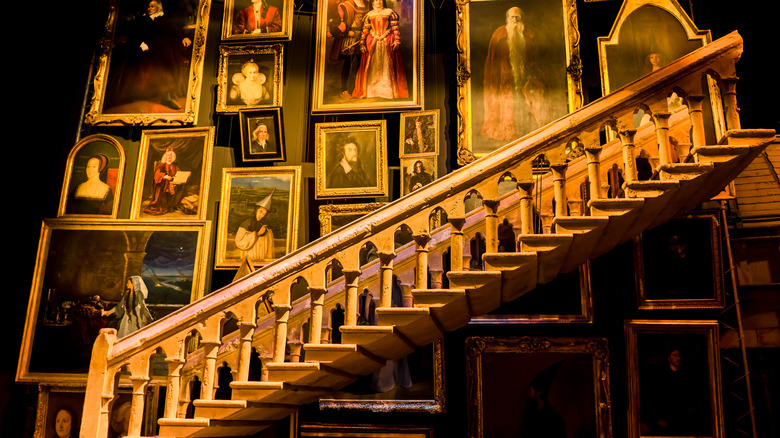The Mythological Figure That Inspired Filch In Harry Potter
The Harry Potter series boasts no shortage of loathsome characters. Lord Voldemort, of course, is chief among them: the entire series revolves around the young man once known as Tom Riddle, who seeks to wrest control of the wizarding world through torture, murder, and magical-people-first prejudice.
Dolores Umbridge serves as Defense Against The Dark Arts Teacher, High Inquisitor, and short-lived Headteacher of Hogwarts School in the series, as well as a high-ranking member of the Ministry of Magic. She's saccharine sweet on the outside and purely poisonous on the inside. Author J.K. Rowling herself wrote on Pottermore (now Wizarding World) that Umbridge is "one of the characters for whom [she] feel[s] purest dislike."
The troubled young wizard had another nemesis: Argus Filch, the school's foul-tempered caretaker. This crotchety character, it's revealed in the novel "Harry Potter and the Chamber of Secrets," is a Squib: a person born to a magical family who cannot perform magic. Resenting the students, he pursues, shouts at, and threatens them for any misdeeds. He seems to see everything, to get around the school in a split second, and lurk in the shadows just like his beloved cat, Mrs. Norris. As it turns out, Filch has good reason for being so all-seeing and all-knowing: he was inspired by a fascinating character from Greek Mythology. Here's the story of Argus Panoptes.
The Ancient Greek Argus Panoptes saw everything, just like Argus Filch
According to Mythology Source, Argus Panoptes was a giant, closely associated with the goddess Hera. A dedicated servant, Argus is said to have been killed during an investigation of Hera's into Zeus' infidelity (which happened often). In this particular instance, Hera was suspicious of Zeus and a priestess of hers, Io. Zeus had transformed Io into a cow in an attempt to deflect any suspicion about her (this being an entirely logical and practical plan), but Hera was used to Zeus' shenanigans. She arranged for cow-Io to be confined to the temple, watched over by the famously attentive Argus Panoptes (Panoptes meaning "all-seeing").
The story ends, Mythology Source continues, with Hermes playing the watchful giant to sleep with enchanted music, then killing him by dropping a boulder on him before freeing Io for Zeus. Hera, predictably, was incensed.
Argus Panoptes' story lives on today in the phrase "the eyes of Argus," a concept suggesting a state of being unceasingly watched. Breaking Defense likens this notion of constant vigilance to the always-on nature of military defense systems, also referencing a common classical depiction of Argus: as a giant with a thousand eyes who saw everything. The cruel caretaker of Harry Potter fame also seems to have a thousand eyes — when it comes to spotting muddy footprints on the Hogwarts castle floors.

